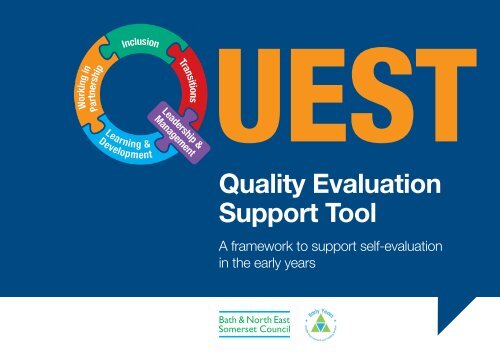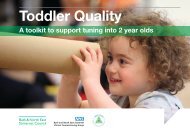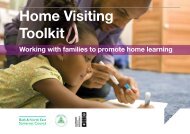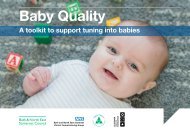Quest Taster Pages
Create successful ePaper yourself
Turn your PDF publications into a flip-book with our unique Google optimized e-Paper software.
UEST<br />
Quality Evaluation<br />
Support Tool<br />
A framework to support self-evaluation<br />
in the early years<br />
<strong>Quest</strong> toolkit A4 aw.indd 1 21/03/2018 14:26
Contents<br />
Forword 3<br />
Introduction 4<br />
Links to Key Resources 8<br />
Section One: Leadership and Management<br />
1a) Vision and Values 10<br />
1b) Safeguarding and Welfare Requirements 12<br />
1c) The Key Person Approach 14<br />
1d) Self- Evaluation 16<br />
1e) Staff Development 18<br />
1f) Monitoring Progress / Closing the Gap 20<br />
Leadership and Management – additional reading 22<br />
Section Two: Inclusion<br />
2a) Early Identification and Support 24<br />
2b) The Inclusive Environment 26<br />
Inclusion – additional reading 28<br />
Section Three: Learning and Development<br />
3a) Observing, Assessing and Supporting Learning 30<br />
3b) The Emotionally Enabling Environment 32<br />
3c) The Physically Enabling Environment 34<br />
3d) The Communication Rich Environment 36<br />
Learning and Development – additional reading 38<br />
Section Four: Working in Partnership<br />
4a) Engaging and Involving Parents 40<br />
4b) Links with Other Professionals 42<br />
Working in Partnership – additional reading 44<br />
Section Five: Transitions<br />
5a) Settling in 46<br />
5b) Moving on 48<br />
Transitions – additional reading 50<br />
Appendices<br />
Appendix One: Links to Ofsted Inspection Handbooks 51<br />
Appendix Two: Glossary of terms 52<br />
Appendix Three: Reflecting on Practice notes page 54<br />
Appendix Four: Development Plan 55<br />
2 Quality Evaluation Support Tool<br />
QUEST Quality Evaluation Support Tool © Bath and North East Somerset Council Early Years Service<br />
<strong>Quest</strong> toolkit A4 aw.indd 2 21/03/2018 14:26
Foreword<br />
In effective early years settings, providers continually reflect on the<br />
provision they offer. They evaluate how they enhance the learning and<br />
development of the children in their care and help to give them the<br />
best possible start in life.<br />
This reflective practice fits securely within the Children’s Service Vision<br />
in Bath & North East Somerset where:<br />
We want all children and young people to enjoy childhood and<br />
be well prepared for life.<br />
This self-evaluative framework will support you as an Early Years<br />
provider to reflect upon your practice and maintain the very best high<br />
quality provision for every child in your care. I am sure you will find this<br />
guidance useful and commend it to you.<br />
“The Ofsted Early Years Inspection<br />
Handbook identifies effective<br />
evaluation of staff practice and evaluation<br />
of staff, parents and children’s views, as<br />
indicators of high quality... Setting managers<br />
described their overall approach to<br />
self-evaluation as integrated and embedded<br />
in their setting’s daily practice”<br />
Study of Early Education and Development:<br />
Good practice in Early Education DfE (2017). p.54-55<br />
Chief Executive, Bath & North East Somerset Council<br />
Quality Evaluation Support Tool 3<br />
QUEST Quality Evaluation Support Tool © Bath and North East Somerset Council Early Years Service<br />
<strong>Quest</strong> toolkit A4 aw.indd 3 21/03/2018 14:26
Introduction<br />
This Quality evaluation support tool (<strong>Quest</strong>) has been developed in response to<br />
requests from leaders and managers of early years settings for guidance on what<br />
high quality Early Years Foundation Stage (EYFS) practice looks like. <strong>Quest</strong> offers a<br />
framework and an approach to help settings maintain and continually improve their<br />
high quality provision.<br />
Why does high quality early years provision matter?<br />
Research consistently shows that high quality early years provision makes a positive<br />
difference to outcomes for children, particularly those from disadvantaged<br />
backgrounds. Children who experience high quality early years provision have<br />
better social and emotional development and capacity to learn – qualities that are<br />
crucial for school and adulthood.<br />
This evidence base underpins the <strong>Quest</strong> framework.<br />
What is <strong>Quest</strong>?<br />
<strong>Quest</strong> is an aspirational framework, designed for all early years providers, whether<br />
school, group or home based. It offers a refl ective structure which will enable a<br />
whole staff team to work together to develop a shared understanding of what high<br />
quality looks like in practice. They will articulate what they already do well, identify<br />
what they still need to do, and plan how to get there, using <strong>Quest</strong> as a structured<br />
guide.<br />
A key strength of <strong>Quest</strong> is that it can be completed in any order, with no set<br />
timeframe. Central to the <strong>Quest</strong> approach is that the whole staff team is involved<br />
so that everyone’s voice is heard as they:<br />
• Assess the quality of their provision and compare it to best practice, as indicated<br />
by Statutory EYFS and Ofsted requirements and current trends.<br />
• Refl ect on their provision from the point of view of the child, keeping children at<br />
the heart of everything that happens by considering ‘What is it like for me here?’.<br />
• Identify and celebrate areas that are working well.<br />
• Identify areas for potential improvement and plan how and when to implement<br />
changes.<br />
“Students who had<br />
attended high quality<br />
pre-schools were more likely to<br />
achieve 5 A*-C including English<br />
and maths.” (p.12)<br />
Taggart,B; Sylva,K; Melhuish,E; Sammons,P and<br />
Siraj, I (2015): Effective pre-school, primary and<br />
secondary education project (EPPSE 3-16+):<br />
How pre-school infl uences children and young<br />
people’s attainment and developmental<br />
outcomes over time; Research Brief;<br />
Department for Education; London<br />
“Learning begins from<br />
birth, and high quality early<br />
education and care has the<br />
potential to make an important and<br />
positive impact on the learning,<br />
development and wellbeing of babies<br />
and young children, in their daily lives<br />
and the longer term.”<br />
Nutbrown, Cathy (2012) Foundations for<br />
Quality: The independent review of early<br />
education and childcare and childcare<br />
qualifi cations; Department for<br />
Education; London<br />
4 Quality Evaluation Support Tool<br />
QUEST Quality Evaluation Support Tool © Bath and North East Somerset Council Early Years Service<br />
<strong>Quest</strong> toolkit A4 aw.indd 4 21/03/2018 14:26
How does <strong>Quest</strong> work?<br />
<strong>Quest</strong> consists of 5 sections which support the principles underpinning high quality<br />
early years practice. Each section is like a jigsaw puzzle piece, which all fi t together<br />
and are secured by the role of leadership and management.<br />
Each section is divided up into sub-sections as listed below.<br />
Section 1: Leadership and Management<br />
1a) Vision and Values<br />
1b) Safeguarding and Welfare<br />
1c) The Key Person Approach<br />
1d) Self-Evaluation<br />
1e) Staff Development<br />
1f) Monitoring Progress /Closing the Gap<br />
Section 2: Inclusion<br />
2a) Early Identifi cation and Support<br />
2b) The Inclusive Environment<br />
Section 3: Learning and Development<br />
3a) Observing, Assessing and Planning for Learning<br />
3b) The Emotionally Enabling Environment<br />
3c) The Physically Enabling Environment<br />
3d) The Communication Rich Environment<br />
Section 4: Working in Partnership<br />
4a) Engaging and Involving Parents<br />
4b) Links with Other Professionals<br />
Section 5: Transactions<br />
5a) Settling in<br />
5b) Moving on<br />
Each sub-section has been linked to the Ofsted Early Years Inspection Handbook<br />
(2015) as set out in Appendix 1.<br />
Quality Evaluation Support Tool 5<br />
QUEST Quality Evaluation Support Tool © Bath and North East Somerset Council Early Years Service<br />
<strong>Quest</strong> toolkit A4 aw.indd 5 21/03/2018 14:26
How do we use <strong>Quest</strong> in my setting?<br />
Each sub-section has two parts:<br />
Part 1: consists of 10 questions to support your setting team to reflect at a deeper<br />
level. The questions are designed to encourage your team to have an open and<br />
honest discussion about current practice, with a focus on everyone being able to<br />
articulate how you know what is working well and what could be improved.<br />
Part 2: consists of a series of statements in two columns; the first indicating the<br />
minimum requirement and the second indicating a higher level of quality,<br />
representing inspirational practice.<br />
The questions in Part 1 should support you to consider whether you meet all, or<br />
part, of each statement in Part 2, which you then highlight as appropriate. Consider<br />
the evidence you have to demonstrate that each statement is embedded in<br />
practice and that all of the team can articulate this.<br />
There are different approaches you could use to involve the whole team, for<br />
example:<br />
• Give everyone a copy of the statements in Part 2 to highlight as their immediate<br />
response and then bring to the staff meeting for further discussion.<br />
• Complete as individual rooms (in a setting with more than one room) and then<br />
bring to discuss.<br />
• Look at a section all together.<br />
• Have a note book or notice board covering questions or statements, where team<br />
members can make notes prior to a staff meeting. This ensures everyone has a<br />
voice even if unable to attend the meeting.<br />
• Invite feedback from parents about a particular section.<br />
Underneath the statements for each section there is space to record your agreed<br />
strengths and the areas you wish to develop. These could be written as bullet<br />
points. A page for ‘Reflecting on Practice’, with more space for you to make notes<br />
on each section if you need this, is included in Appendix Three. You may also want<br />
to record where your evidence can be found.<br />
You do not have to create a folder of evidence but you could if you feel this would<br />
be useful.<br />
Development Plan<br />
Once you have used the framework to identify your strengths and areas for<br />
development, you can use the Development Plan in Appendix Four to support you<br />
to make the agreed changes. You may have identified a number of areas that you<br />
want to develop. When writing your plan be realistic about how many<br />
developments to include. Some may be more important than others, some may<br />
require immediate action and others might be easy to implement with little planning.<br />
Your Development Plan will be useful to help you consider which actions or tasks<br />
are needed to achieve each development. The plan will also help you to think about<br />
the capacity of your team and to set realistic time scales, by identifying who will<br />
lead on each of the actions and tasks.<br />
6 Quality Evaluation Support Tool<br />
QUEST Quality Evaluation Support Tool © Bath and North East Somerset Council Early Years Service<br />
<strong>Quest</strong> toolkit A4 aw.indd 6 21/03/2018 14:26
Things to consider<br />
Which section will you start with and why?<br />
How will you involve all staff, families and children in each section?<br />
How will you space your staff meetings so that you can give each section the time<br />
it needs? The cycle looks like this:<br />
6. Reviewing<br />
What difference has this<br />
made for children’s learning<br />
and development?<br />
continue<br />
1. Deciding<br />
Agree which section we are<br />
going to evaluate<br />
2. Evaluating<br />
Refl ect on the section<br />
with the whole staff team<br />
5. Doing<br />
Implementing<br />
the developments<br />
Self evaluation process<br />
4. Planning for action<br />
Write actions onto<br />
development plan<br />
3. Recording<br />
Agree strengths<br />
and developments<br />
Quality Evaluation Support Tool 7<br />
QUEST Quality Evaluation Support Tool © Bath and North East Somerset Council Early Years Service<br />
<strong>Quest</strong> toolkit A4 aw.indd 7 21/03/2018 14:26
What else is in the <strong>Quest</strong> framework?<br />
• A glossary of useful terms<br />
• Links to the Ofsted inspection handbooks for both Early Years and Schools<br />
• Links to further reading at the end of each section<br />
• A template for a Development Plan<br />
What support can I get from the Early Years Service?<br />
In Bath and North East Somerset the <strong>Quest</strong> framework comes with a one hour<br />
briefing session to explain how it works.<br />
Follow up email and telephone support will be available from the Early Years<br />
Service. Further options for support will be explained at the introductory meeting.<br />
We hope you enjoy using <strong>Quest</strong> to evaluate your practice; celebrating your<br />
strengths, identifying areas to develop and ensuring that the child is kept at the<br />
heart of all that you do.<br />
With thanks to the following early years settings which trialled and contributed ideas<br />
to the making of <strong>Quest</strong>: Barnaby Pre-school, Free Rangers Nursery, Timsbury<br />
Pre-school, St Keyna Primary School Nursery, St Saviour’s Primary School Nursery,<br />
and Queen’s Road Pre-school.<br />
Links to Key Resources<br />
This is not an extensive list but includes examples of resources and websites that<br />
you may find useful.<br />
Early Years Foundation Stage Statutory Framework<br />
http://www.foundationyears.org.uk/eyfs-statutory-framework/<br />
Development Matters<br />
http://www.foundationyears.org.uk/wp-content/uploads/2012/03/Development-<br />
Matters-FINAL- PRINT-AMENDED.pdf<br />
Early Years Outcomes<br />
http://www.foundationyears.org.uk/files/2012/03/Early_Years_Outcomes.pdf<br />
Early Years Inspection Handbook<br />
https://www.gov.uk/government/publications/early-years-inspection-handbookfrom-september-<br />
2015<br />
School Inspection Handbook<br />
https://www.gov.uk/government/publications/school-inspection-handbook-fromseptember-2015<br />
Inspecting Safeguarding<br />
https://www.gov.uk/government/publications/inspecting-safeguarding-in-earlyyears-education-<br />
and-skills-from-september-2015<br />
SEND Code of Practice<br />
https://www.gov.uk/government/publications/send-code-of-practice-0-to-25<br />
Prevent Duty Advice for Schools and Childcare Settings<br />
http://www.foundationyears.org.uk/2015/07/advice-for-schools-and-childcareproviders-on-the-<br />
prevent-duty/<br />
Foundation Years Website has useful resources across all aspects<br />
of the EYFS<br />
http://www.foundationyears.org.uk/<br />
Bath and North East Somerset Council Early Years Service offers an extensive<br />
programme of CPD training opportunities and resources which can be viewed and<br />
accessed via our B&NES online HUB at http://thehub.bathnes.gov.uk/Home<br />
Please note, if you do not already have one, you will require a log in to book places<br />
on training courses. We welcome new members to our online HUB even if you are<br />
out of our local authority area. Please contact early_years@bathnes.gov.uk for<br />
more information.<br />
8 Quality Evaluation Support Tool<br />
QUEST Quality Evaluation Support Tool © Bath and North East Somerset Council Early Years Service<br />
<strong>Quest</strong> toolkit A4 aw.indd 8 21/03/2018 14:26
Section 1:<br />
Leadership and Management<br />
1Quality Evaluation Support Tool 9<br />
QUEST Quality Evaluation Support Tool © Bath and North East Somerset Council Early Years Service<br />
<strong>Quest</strong> toolkit A4 aw.indd 9 21/03/2018 14:26
Section 1: Leadership and Management<br />
1a) Vision and Values<br />
What is this section about?<br />
This section is about our views and beliefs. It invites us to reflect<br />
upon the core vision and values that underpin everything we do.<br />
It also invites us to reflect upon how we ensure this is embedded<br />
throughout our daily practice and shared with staff and families.<br />
Key questions/ things to think about<br />
1. What do we understand by the terms below and how is each shown and<br />
agreed?<br />
• School readiness<br />
• Key person<br />
• Safeguarding<br />
• Partnership working<br />
• Teaching<br />
• British values<br />
• Home learning<br />
• Closing the gap<br />
2. What do we all understand are our current vision and values?<br />
3. What opportunities do we provide to continually review and/or update these?<br />
4. How do we ensure our vision and values underpin our working policies and<br />
procedures?<br />
5. How do we know we are embedding and sharing British values throughout<br />
our work?<br />
6. How do we include the voices of the children and parents/carers in our<br />
setting’s vision and values?<br />
7. How do we share our vision and values with new parents/carers?<br />
8. How do we ensure that our vision and values are reflected in our recruitment<br />
and retention process?<br />
9. How does our everyday practice reflect on what we believe and know about<br />
how young children learn and develop?<br />
10. What are our beliefs about the importance of working in partnership with<br />
parents and how is this reflected in our practice?<br />
10 Quality Evaluation Support Tool<br />
QUEST Quality Evaluation Support Tool © Bath and North East Somerset Council Early Years Service<br />
<strong>Quest</strong> toolkit A4 aw.indd 10 21/03/2018 14:26
Section 1: Leadership and Management<br />
1a) Vision and Values<br />
Minimum requirement<br />
• All staff, children and families have a shared understanding of the setting’s<br />
vision and core values.<br />
• The setting has a ‘can do’ attitude towards including all children and this is<br />
reflected in the settings core values.<br />
• All staff including students and volunteers, have a shared understanding of the<br />
meaning of the following:<br />
– School readiness<br />
– Safeguarding<br />
– Key person approach<br />
– Partnership working<br />
– Teaching<br />
– British values<br />
– Home learning<br />
– Closing the gap<br />
Inspirational<br />
• The vision and values are inspirationally led and the setting is highly motivated<br />
to make this a reality.<br />
• All staff, children and their families have regular opportunities to reflect on how<br />
the setting puts its vision and core values into practice.<br />
• There is clearly written local offer for supporting children with SEND.<br />
• All staff including students and volunteers can articulate the setting’s ethos and<br />
approach to each of the following:<br />
– School readiness<br />
– Safeguarding<br />
– Key person approach<br />
– Partnership working<br />
– Teaching<br />
– British values<br />
– Home learning<br />
– Closing the gap<br />
What is working well?<br />
What do we need to develop next and why?<br />
Quality Evaluation Support Tool 11<br />
QUEST Quality Evaluation Support Tool © Bath and North East Somerset Council Early Years Service<br />
<strong>Quest</strong> toolkit A4 aw.indd 11 21/03/2018 14:26
Section 1: Leadership and Management<br />
1b) Safeguarding and Welfare<br />
What is this section about?<br />
This section is about how our setting meets the Safeguarding and<br />
Welfare requirements of the EYFS and how this is embedded within<br />
practice. It invites us to reflect on how we ensure all staff, which<br />
includes apprentices, students, part time staff, and volunteers, are<br />
clear about their statutory responsibilities and how this information is<br />
shared with them.<br />
Key questions/ things to think about<br />
1. How do we ensure we are meeting all of the EYFS statutory requirements?<br />
2. How often do we review policies and procedures and who is involved?<br />
3. How do we ensure that all practitioners are aware of, and implement, the<br />
settings policies?<br />
4. How do we ensure we have robust safer recruitment and retention<br />
processes in place?<br />
5. How do we know that all staff are knowledgeable both about indicators of<br />
abuse or neglect and about what do if they have a concern about a child’s<br />
welfare?<br />
6. How do we deal with any complaints or concerns from parents?<br />
7. How and why do we monitor attendance? What would we do to address<br />
poor/ non- attendance?<br />
8. How do we ensure all staff have an awareness of the Prevent duty and how<br />
this is relevant to them?<br />
9. How do we create a culture of vigilance with all staff in our setting?<br />
10. How transparent are our safeguarding systems and how are they shared<br />
with families and other professionals?<br />
12 Quality Evaluation Support Tool<br />
QUEST Quality Evaluation Support Tool © Bath and North East Somerset Council Early Years Service<br />
<strong>Quest</strong> toolkit A4 aw.indd 12 21/03/2018 14:26
Section 1: Leadership and Management<br />
1b) Safeguarding and Welfare<br />
Minimum requirement<br />
• Leaders and managers have effective systems in place to monitor the<br />
implementation of safeguarding and welfare requirements to ensure these are<br />
embedded across the setting.<br />
• A Safeguarding audit is carried out and all statutory requirements are met.<br />
• Leaders and managers recognise the importance of monitoring all children’s<br />
attendance.<br />
• Leaders and managers ensure all staff understand their role under the<br />
Prevent duty.<br />
Inspirational<br />
• All staff are actively involved in safeguarding and a culture of vigilance is<br />
embedded.<br />
• Leaders and managers ensure all staff are alert to potential risks of<br />
radicalisation and extremism.<br />
• Leaders and managers are proactive to establish reasons for poor/<br />
non-attendance are have measures in place to address these.<br />
• All staff can articulate their knowledge of the current statutory duties and how<br />
they are embedded in everyday practice.<br />
• Leaders and managers understand their statutory duty under the SEND code<br />
of practice and Equality Act and implement them across the setting.<br />
What is working well?<br />
What do we need to develop next and why?<br />
Quality Evaluation Support Tool 13<br />
QUEST Quality Evaluation Support Tool © Bath and North East Somerset Council Early Years Service<br />
<strong>Quest</strong> toolkit A4 aw.indd 13 21/03/2018 14:26
Section 1: Leadership and Management<br />
1c) Key Person<br />
What is this section about?<br />
This section is about how our setting develops the key person<br />
approach. It invites us to think about the responsibilities of a key<br />
person in our setting and how this is shared with parents / carers. It<br />
also invites us to evaluate our approach to ensure it works for<br />
everyone, including staff, parents/carers and children.<br />
Key questions / things to think about<br />
1. What is our understanding of attachment?<br />
2. How can we tell that every child feels that they are important to their key<br />
person and that they are being kept in their mind?<br />
3. How does the key person approach work in our setting?<br />
4. What things do we consider before allocating children to a key person?<br />
5. How do we support new staff to understand our key person approach?<br />
6. How do we enable our staff to be confident to have challenging<br />
conversations with parents/carers?<br />
7. How are we embedding our key person approach in ongoing support and<br />
supervision?<br />
8. How do we enable each key person to build a holistic picture of all of their<br />
key children and how does this help them to understand the learning and<br />
development of each of their key children?<br />
9. How are we empowering each key person to take a lead in supporting their<br />
vulnerable key children including those with SEND? For example, attending<br />
SEN support meetings, leading reviews, developing ‘My plans at SEN<br />
support’, or working with other professionals.<br />
10. How do we know that our key person approach is working effectively for<br />
each practitioner, child and family?<br />
14 Quality Evaluation Support Tool<br />
QUEST Quality Evaluation Support Tool © Bath and North East Somerset Council Early Years Service<br />
<strong>Quest</strong> toolkit A4 aw.indd 14 21/03/2018 14:26





